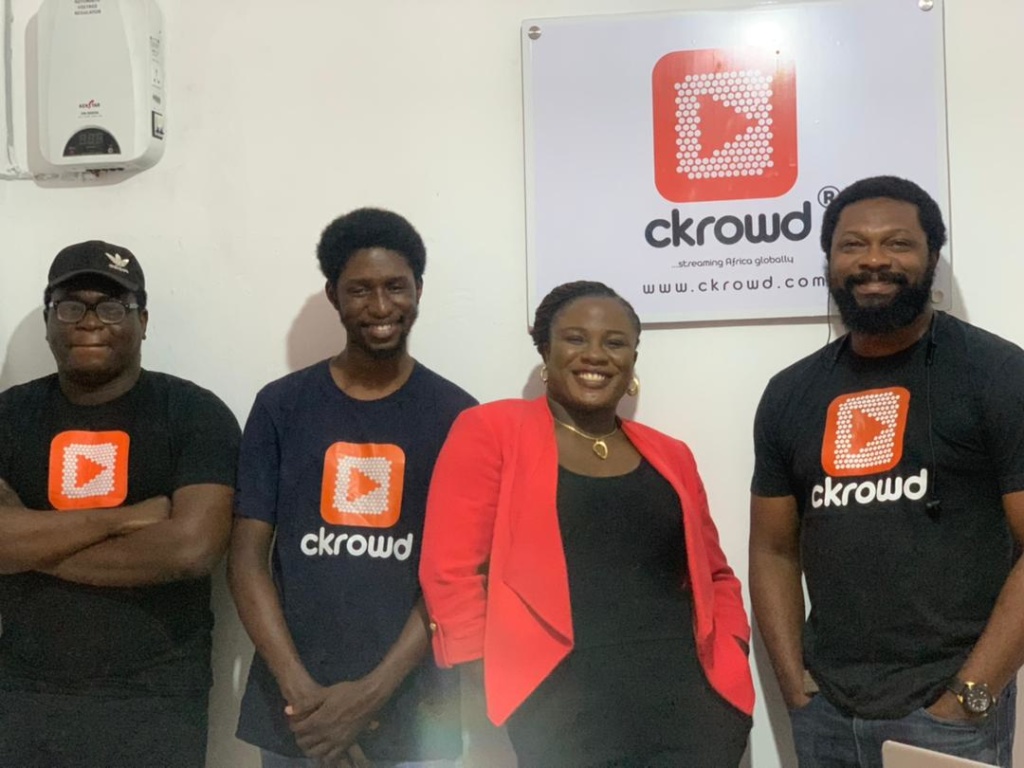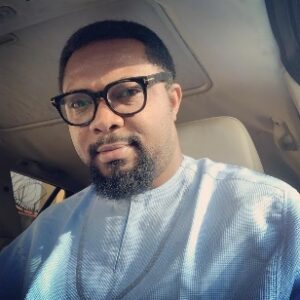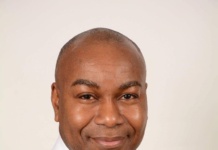
Kayode Adebayo is the Chief Executive Officer (CEO) of Ckrowd, a video monetization, and content marketplace. The platform is a direct-to-consumer platform where original and exclusive content in education, information, and entertainment is distributed directly to local and global consumers in a short video and live stream format.
In this interview by OLAKUNLE AGBOOLA, he speaks about the platform, its unique offerings for content creators across Africa, and how a global disruption in the content marketplace from Africa is imminent.

Who is Kayode Adebayo?
My name is Kayode Adebayo, a native of Idoani in Ondo State. I studied estate management at Obafemi Awolowo University, Ile-Ife. After that, I had some international stints at Chicago business school and Rutgers University, New Jersey; they were certificate courses. I am still in the construction and hospitality business but somehow, I started a media company 6-7 years ago which we decided we want to uniquely position ourselves to create solutions for the creative industry because we saw an industry which was global and the practitioners in the industry were unskilled and did not understand much about enterprise or anything around it. So, we decided to provide enterprise development for creative industry professionals and the platform to showcase them and help them network with international contemporaries.
We partnered with Facebook and Goggle, bringing creative professionals together; the well-seasoned ones and the ones thinking of coming to the industry and not just talent so that they can make better revenue for themselves. Two years we started a technology business called Ckrowd because we wanted to give more to the creative industry because we felt the industry professionals were morphing into becoming content creators and we wanted to give them a platform that understood them, the culture of the African business environment but was world standard in the technology that it represents and the products it has, to be able to solve content distribution and publishing for African creators from a video perspective.
We call it a video monetization platform and a content marketplace where creators in education, music, and entertainment can distribute their content locally and distribute it to audiences locally and internationally that allowing them to generate local and foreign exchange for their content and enjoy premium value for their content Because the available platforms are not doing enough for them, they were making fractures of a penny for the tough work that they do. So, that’s the journey.
Holistically, what are your views about the creative industry in Nigeria and Africa?
I believe the creative industry is one of the most global products Africa has, it’s what makes us uniquely who we are. We share oil, gold, silver, and other resources but what makes you unique in a global world is what stands you out. Africa is blessed because we have cultural assets, creative assets. For example, we have 54 countries in Africa and close to 5000 tribes so you can imagine the nearly infinite culture that is available on the continent.
Then Africa somehow sits on a unique geographical location with all the natural resources and even 1.3 billion people so it’s hard to ignore Africa. If you want to get the best out of Africa for commercial opportunities, it means you must understand the people, understand the lifestyle, and how to interact with them to get anything done. For a long time, Africa has never thought that was any form of asset or think it was valuable. Over 15 years now we have started to know the value of what we are, projecting it that way and that’s what makes our culture commercially viable and now became export products for us. Music, fashion, food, film creative film even our technology can be modified to cater to our needs.
Do you think we’ve done so well in exporting our culture before we talk of distribution and monetization?
I think we are getting there. I think for some reason Nigerians being such a group of people in Africa have blown into loving ourselves and not being ashamed of expressing ourselves and its because some Nigerians were able to get some level of exposure at a particular time in the international forum, realizing the others do not have two heads. We came un-exposed and decided to have a lot of confidence in who we were as a people -or culture, the way we dress. Our accent – we embraced it fully and we now begin to express it beyond ourselves.
Another thing is Nigerians being who we are, have been able to experience very strong and confident people coming from Nigeria. That has also given us a lot of confidence, like having a Nigerian man being one of the richest men in the world, the telecommunications companies in Nigeria. We are the largest number of people on most of these technological platforms. So, we have a voice, the population has done quite a lot for us. We are getting there
You’ve been in the creative industry for a while. How would you encourage young creatives to export who we are to the 0utside world?
That’s one of the things Ckrowd is trying to do. We are here to cater basically to Hollywood Nigeria. We want to give the platform to producers giving fantastic content but somehow don’t know how to play in the politics of putting their work in the Cinema or platforms like Netflix. That’s why we have documentaries on who we are on Ckrowd. I think people are getting to see the importance and what we can call ‘holy anger about being misrepresented and I believe a lot of creators are already catering to those things, but they need platforms that are third-party platforms: the ones that connect Africans directly to the African stories.
You once said the creative Industry well maximized will boost the economy more than Agriculture. Can you explicate this?
Yes, what we have is inexhaustible. Take, for instance, Music, we will go on and on. The music genre that has opened the doors right now is Afrobeats. Imagine all the genres and the music we have been exposed to since we were young, not to mention the instrumentation, the making of that instrument, and the use of talking drums to transmit information before the advent of newspapers. Let’s not even mention Fashion and the entire continent. Imagine documenting these and repackaging them and people to pay. For instance, 1 dollar by 1 billion people.
If Black Panther can do well to that level even though we know being local Africans that are not very African. You can imagine we have the same kind of energy for more than originally Africa and we can give it that level of global exposure. We’ve not even mentioned literature, animation, or feature films. For me, it’s not about the money now, that’ll be the lowest form of its value but being able to see it as the Intellectual property of Africans.
Assessing what is happening with the music industry, Afropop is heavily consumed internationally, do you see the Film Industry taking a giant stride?
Yes, I do. The reason the music industry is doing well now is because of capitalism. Nollywood has become a kind of pastime for a lot of people, consuming it heavily in the Caribbean, Brazil, etc. However, I have friends in the industry that are already in talks with high-level Hollywood practitioners. For instance, we were invited to the Cannes Film Festival to push Ckrowd but we felt that we were not ready yet.
Capitalism has found out there’s demand and we have found out now that distribution is not an issue. What needs to happen now is connecting distribution and demand with Finance. I think that’s the smallest aspect because in business once there’s demand, there is value, money will find demand eventually. By that time, I hope we would preserve the Nollywoodish feel our content has and not lose that brand because we are trying to get the attention of the world. If we lose it, then it means we might need to redefine ourselves in another line which I don’t think it’s what we should be doing at that stage. At that stage, we should be looking towards upscaling.
Nollywood used to earn more than music but now it is different. I think Nollywood needs to be more resilient.
Is Nigeria encouraging or embracing the Digital Economy?
I think we are. No gadget or content is being viewed anywhere in the world that we don’t have here in Nigeria. Nigerians are very exposed people; we are even far ahead. The only thing we should control is the infrastructure. We have a large presence on social media, more than a whole country’s population. We only need infrastructure to enable us to speed up our activities. For example, imagine we have high-speed internet broadband and other infrastructure like power will make things better. But I think we moved far from where we should be as a country.
Recently, you partnered with Kamp Africa to provide monetization and brand development to content creators, can you highlight what Africa can benefit from this?
Firstly, We have the youngest demographic in the world, people between 18 – 27, and most of our people are tech savvy you can see how involved they are in cryptocurrency and content creation. That partnership was needed because we want to give social media influencers opportunities on the Ckrowd platforms. Because Ckrowd is designed as a service for on-demand content. The idea is that there are film producers that create on-demand content and want to publish to generate revenue and the social media creators who distribute on their own. We wanted to create that opportunity for them because our platform is more of a monetization platform where you create exclusive content for an exclusive audience, more like your super fans and they can reward you for giving them the access. The platforms available now don’t do that, what they do is they take content without rewarding these creators.
Kamp Africa is a talent management/business management company for social media influencers. From what we have now, they have about 15 huge Tik Tok Influencers that have an average of 1 million followers each. Our partnership with them was more of onboarding these influencers and allowing them to monetize the content they’ve created for other platforms while commercially empowering them financially. That could serve as an encouragement to the wider social community that it becomes an economy. We want to get more people employed in the creator economy and leverage it to give themselves a good life.
How does Monetization work?
Ckrowd mimics a digital arena sitting in the cloud that can put a paywall on your content and you get an access fee when people access it. We have four revenue models: 1, the pay-per-view model where you can pay and watch on the go without commitment or subscription, we call it Ckrowd digital cinema, there’s the subscription option, there’s the donation option, and the content rental model which allows you to rent content for a week. The revenue model was chosen to cater to Africans and their behavioral patterns. We want all content creators, TV producers, and influencers to own their TV on Ckrowd where they bring their fans and charge consumers for whatever kind of content they are sharing.
What are been the challenges of ckrowd?
The first challenge we have is the manpower challenge. Although technology has gone full-blown, it is still new terrain for Africa and Africans, so we continue to have a shortage of skilled manpower, especially at the development level. Just because the internet picked up because of COVID, the very good hands that are available are being priced out of the market. The other one is infrastructure, and we pay for some of this external infrastructure in dollars which is a sort of capital flight. Thirdly, talent acquisition. The kind of content creators we want already have attained a kind of king status. So, it takes a lot of convincing to bring them in. But we don’t want to convince them anymore. We want to grow to that point they come in themselves and enable us to grow organically.
Lastly, Finances. Finances can help us speed up a lot of our activities. Although this pace has allowed us to learn a lot too. So far, we have been able to acquire a pre-seed fund, and we won an export promotion grant. These are the main challenges but overall, it has been interesting and fun.
Kindly follow us on twitter:@AfricanVoice2






